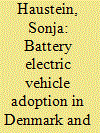|
|
|
Sort Order |
|
|
|
Items / Page
|
|
|
|
|
|
|
| Srl | Item |
| 1 |
ID:
177345


|
|
|
|
|
| Summary/Abstract |
Countries worldwide are trying to increase the share of battery electric vehicles (BEVs) to reach environmental goals. As part of these efforts, the EU project GREAT installed new fast chargers in Denmark and Sweden and provided possibilities to test BEVs and inform about them. To monitor changes in attitudes and behaviours and to estimate the impact of project activities, surveys with BEV and conventional car users were conducted in 2017, 2018, and 2019. We found that attitudes and driving behaviour of BEV users and non-users remained quite stable. While car users in Denmark and Sweden showed similar profiles, one exception was a more negative evaluation of and higher uncertainty about political support for BEVs by Danes. Modelling purchase intention, we found a significant effect of the new fast chargers in Denmark but not in Sweden, while the opposite was the case for information campaigns. Lifestyle compatibility and symbolic-affective attitudes were relevant for BEV adoption in both countries. For cross-border trips, the most relevant factor was whether people had a Tesla or not, reflecting the better driving range and fast charging infrastructure. An increase of charging infrastructure, clearer policy signals and symbolic-affective marketing are discussed as ways to increase BEV adoption.
|
|
|
|
|
|
|
|
|
|
|
|
|
|
|
|
| 2 |
ID:
162334


|
|
|
|
|
| Summary/Abstract |
The importance of foreign direct investment (FDI) for the development of renewable energy in developing countries has been increasingly recognized. Numerous countries have created various measures to attract FDI in the renewable energy sector. This paper uses the analytical hierarch process to clarify the relative significance of the determinants in the location decisions of foreign wind and solar energy investors. A total of 18 determinants that are categorized into the macroeconomic environment, institutional environment, natural conditions, and renewable energy policy categories are used for the analysis. The results show that adding to the traditional determinants of FDI, including the macroeconomic environment, the institutional environment, and natural conditions, renewable energy support policies have the same or stronger influence as location determinants of FDI. The paper also points out that some of the traditional determinants, such as exchange rate volatility, access to land, and an efficient and transparent administrative procedure, are also very important as determinants of FDI in wind and solar energy. Policy implications focus on the determinants of FDI in wind and solar energy. The relative significance of the determinants clarified through this study offers criteria for prioritizing policies and actions for policy makers.
|
|
|
|
|
|
|
|
|
|
|
|
|
|
|
|
| 3 |
ID:
162339


|
|
|
|
|
| Summary/Abstract |
The importance of foreign direct investment (FDI) for the development of renewable energy in developing countries has been increasingly recognized. Numerous countries have created various measures to attract FDI in the renewable energy sector. This paper uses the analytical hierarch process to clarify the relative significance of the determinants in the location decisions of foreign wind and solar energy investors. A total of 18 determinants that are categorized into the macroeconomic environment, institutional environment, natural conditions, and renewable energy policy categories are used for the analysis. The results show that adding to the traditional determinants of FDI, including the macroeconomic environment, the institutional environment, and natural conditions, renewable energy support policies have the same or stronger influence as location determinants of FDI. The paper also points out that some of the traditional determinants, such as exchange rate volatility, access to land, and an efficient and transparent administrative procedure, are also very important as determinants of FDI in wind and solar energy. Policy implications focus on the determinants of FDI in wind and solar energy. The relative significance of the determinants clarified through this study offers criteria for prioritizing policies and actions for policy makers.
|
|
|
|
|
|
|
|
|
|
|
|
|
|
|
|
| 4 |
ID:
176818


|
|
|
|
|
| Summary/Abstract |
As the environmental issues become increasingly severe, great attention has been paid to the development of electric vehicles. In order to better develop the green economy, this paper studies a supply-chain system under policy intervention, which is composed of strategic customers, the government, two manufacturers which respectively produce electric vehicles and fuel vehicles. The paper aims to research the impacts of pricing time on profitability and stability. The different timing patterns of pricing divide into two game structures, namely Stackelberg pricing game and simultaneous pricing game. With the adjustment of parameters, the state of the system is switched between stability and instability, so some effective methods are lead-in to analysis it. Analytic results reveal how subsidy and carbon emission constraint affect supply-chain system operation, since the whole market operation lasts for a long term, subsidy may always have negative impact on the system's stability, which may drive the system operation to be uncontrollable. By comparison, Stackelberg pricing strategy with characteristics of time-delay is more adaptable for system operational management, which makes the system more flexible to adjust supply-chain system status in time.
|
|
|
|
|
|
|
|
|
|
|
|
|
|
|
|
|
|
|
|
|